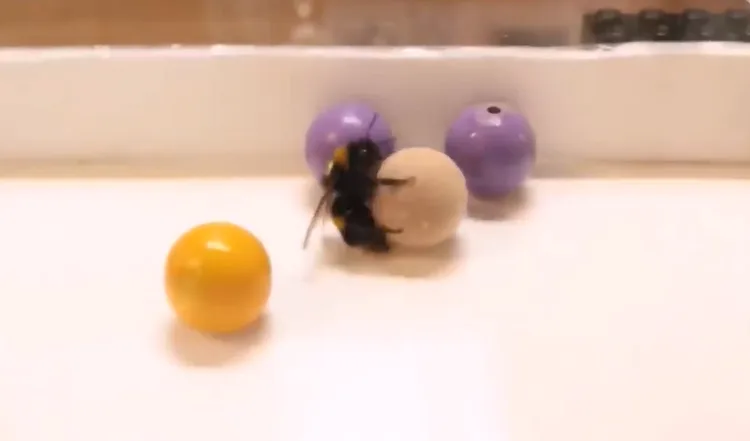
Buzzworthy news: Bees observed playing
There is still a lot to learn about these tiny creatures.
Here's some buzz-worthy news: Bumblebees play.
That's according to an adorable new study from researchers at Queen Mary University of London, published in the journal Animal Behaviour.
While it isn't clear why bees appear to engage in this activity, scientists know playing has several evolutionary advantages. It can build problem-solving skills, boost intelligence, and promote resilience.
"We know that bees are efficient learners," Samadi Galpayage, a PhD student and the study's lead author, tells The Weather Network.
"In the wild, they need to learn to open flowers, and to handle flowers, and to figure out where the nectar and pollen might be."
Play might be a way for bees to master these skills, and it hints they may experience positive emotions, like pleasure.
Researchers followed 45 bumblebees in an arena with a fully-stocked feeding area and a 'play' area containing wooden balls. Some bees rolled the balls 117 times during the experiment, suggesting the exercise was rewarding in and of itself.

Diagram of the experimental setup. (Galpayage et al.)
"We found, when tested for the five criteria of play, that bees were engaging in this activity repeatedly for no apparent reason. It seemed to be rewarding."
Juvenile bees played more often than adults in the experiment, a behaviour that mimics other species.
The idea for the paper builds upon previous work by a colleague of Galpayage's.
"So there was a circle on a platform, and the bees had to roll this ball in exchange for a sugar reward. While this experiment was running, my colleagues noticed that sometimes the bees would roll these balls without getting any food, outside of the experimental setup. This led to more questions like, what's happening? Why are the bees doing this? Is this random?"
While there is anecdotal evidence of ants and wasps engaging in behaviour that looks like play, Galpayage says this is the first study on play and insects.
"I hope this makes people think and maybe have a bit more empathy towards smaller animals, even if they have little brains, because it doesn't mean that they're any less sentient than larger, fluffy animals that we might care about," she adds.











